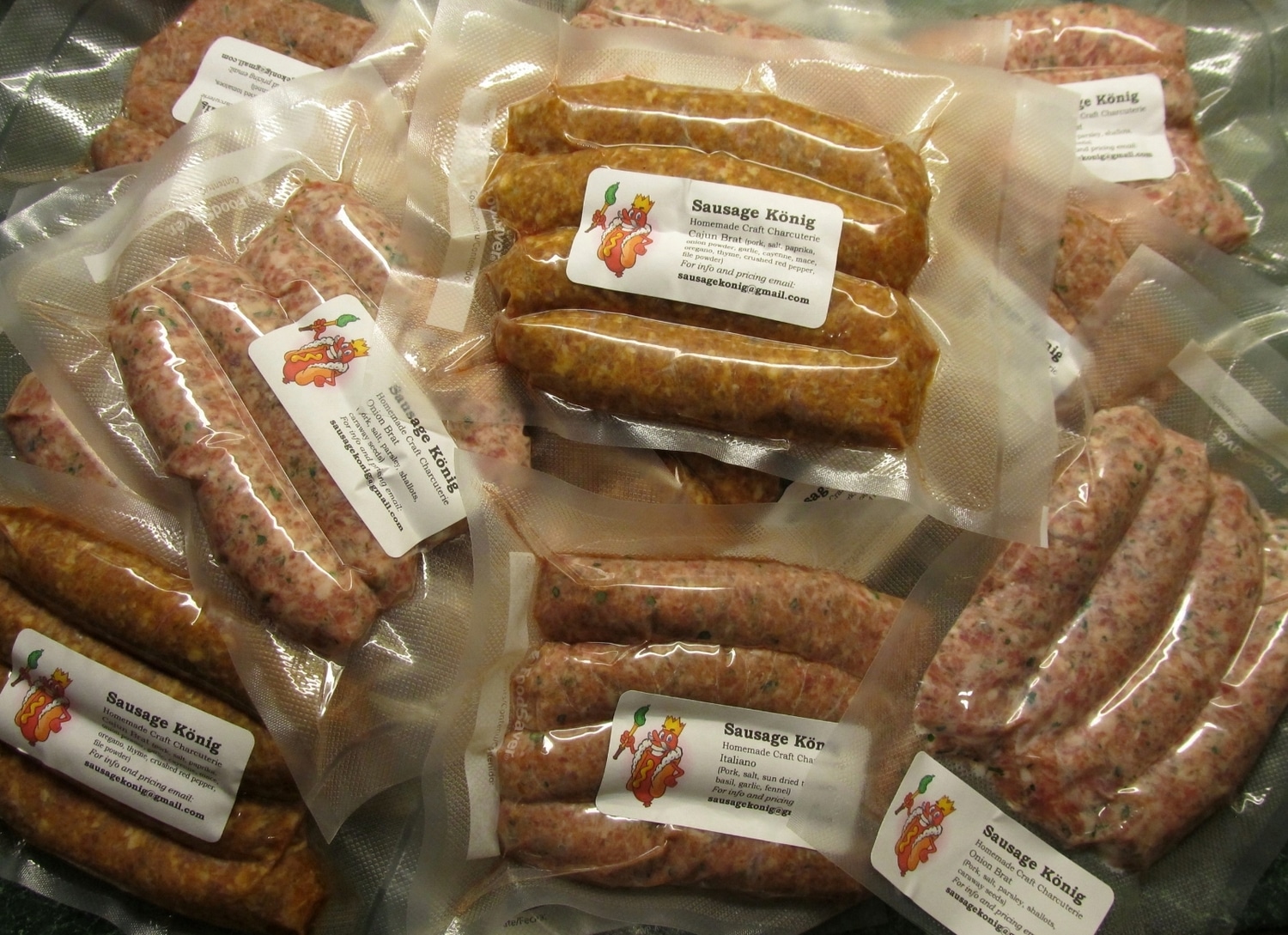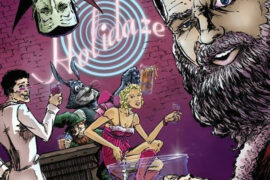On this week’s episode
- Peter Andros, a sausage artisan, describes his experience running a specialty food business.
- Andros shares his colorful professional background, and how he got his business, Sausage König, up and running.
- We talk about the day to day work Andros does as an entrepreneur, including the comical stories he shares about his customers at the farmer’s markets.
About the show
You Have a Cool Job is a podcast hosted by Taylor Sienkiewicz from Peterson’s. The show highlights professionals who have a unique, interesting, uncommon, or otherwise cool job.
Our goal is to motivate you and show how interesting, fulfilling, and anything-but-average your career can be, and we’ll do this by talking with people who took a path less traveled. We ask these fascinating individuals how they got to where they are in their career based on their education, experience, and influences; why they love their job; and lots more.
Want more?
If you like what you’re hearing, check out these resources to get plugged in.
For more episodes of You Have a Cool Job, visit our YouTube channel. View other podcast blogs here.
Subscribe to receive an email containing each podcast episode of You Have a Cool Job as they’re released.
Learn more about Peter Andros’ business here.
Have a nomination for the show? Drop a line here.

Transcript of Episode 2
HOST SHOW INTRO: Hello and welcome. From Peterson’s, I’m Taylor Sienkiewicz and you’re listening to “You Have a Cool Job”, a podcast highlighting those who took their profession in a unique direction, and what they did to get there.
THEME MUSIC
HOST INTRO: On today’s episode of you have a cool job, we talk to Peter Andros. Call him an artisan, an entrepreneur, or a farmer’s marketeer, but basically, the man makes a ton of really great sausage. Let’s hear what he has to say about how it all started.
PETER ANDROS: It all started with bacon basically. I got a book on how to cure bacon, making meats and making sausages and stuff. The first part is always using salt, so I learned how to make bacon and then the very next chapter was sausage so it was well what do you need to make sausage oh so you need a little bit of equipment and some seasonings and that’s about it. Being in Chicago a lot of the other things like casings and pork fat are pretty readily available so I started making my own sausages about eight years ago, and then three years ago my wife and I started a business making, having a sausage business which is a catering business but we sell directly to customers and work at farmers markets and have a website where people can order and we deliver here in Chicago.
HOST: Now three years deep in the business, Peter shared what exactly running a sausage business entails.
PETER ANDROS: For the most part the bulk of our business is selling sausages that I make they’re all my recipes that I’ve come up with. I make them all myself and we sell mostly in frozen packages. I make them fresh and then vacuum package them and freeze them and sell them at the farmers markets and through our website. We also do some small events every now and then. Around Christmas Time we’ll do some Christmas market events right here in Chicago where we’ll prepare some hot foods and also have holiday boxes but for the most part it’s mostly about the selling the packages of sausage.
HOST: You wouldn’t think of sausage as necessarily a seasonal business, but it is. Peter explained what he does to run his business day to day and season to season.
PETER ANDROS: There’s a lot of making it that goes on especially during the summer when we’re at full swing with the farmer’s markets. I was just contemplating that this morning how the markets are ending and I’ve gone from making about 250 pounds of sausage a week down to about 50 pounds so once the markets end things quiet down but during the summertime I’m usually out I make everything in a commercial kitchen, I rent time and space and I’m usually out there three days a week making sausages, making probably six different flavors for our markets we’re in three markets right now and each one they probably buy about 70-80 pounds per market so it’s definitely busy keeping up with all of that in the summertime. A typical day where I’m not at the kitchen is usually spent prepping to make more sausages which is going around, getting supplies, and whether it’s getting ready for the next market if I’m not at the kitchen making it I’m getting supplies getting ready to make the sausages or getting ready for the market with samples and things like that.
HOST: Of course, running a business extends beyond making a product. While this is Peter’s area of expertise, his wife takes on more of a financial role.
PETER ANDROS: It’s just me and my wife. She’s the brains behind the operation. She’s the one that makes sure that we’re making money. She’s pretty smart that way so she runs everything on the back end, all the numbers she pretty much takes care of, I pretty much am making the sausage and selling the sausage.
HOST: Peter also explained how him and his wife intertwined their skills to get the business off the ground.
PETER ANDROS: Getting it off the ground was, part of it I’m definitely lucky to have married an MBA so she has a good idea about setting up at least the finance part of it and knowing what we need to do for that and making sure that it’s going to make money. Other than that, one of the first things I did was looking into, how do you get a business license, what type of business license do you need and just going off the state websites like the state of Illinois website and figuring out how to go about that. I have a couple of friends who are attorneys so I asked them basic questions about trying to figure out how to I go about establishing a business, what do I need to do and they’d point me in the right direction like go look at this, I have to get a federal identification number so I’ve got to do that, and then you register with the state, then you find out then for me especially being in a food industry was, in Chicago and around here there are a lot of commercial kitchens that just rent kitchen times and space for catering businesses, food trucks, things like that. And so you just go around do your research find one that you can match what you’re looking for and for us it was a little more about flexibility, we use one that’s out in the suburbs where we get that where the kitchen we use has, you purchase x amount of hours for a month and, one of the benefits of being out in the suburbs, it’s a little bit more of a commute for me but, if you don’t use the hours there they roll over into the next month so you can carry unused hours over which for me is big in the winter time because I’m not really out there making tons of sausage in the wintertime we made a bunch it was frozen, stored out there but in the summertime I definitely use up all those hours where as opposed to kitchens here in the city they usually are use it or lose it, you have to have set schedules and it makes it a little more difficult.
HOST: Being an entrepreneur means different things to different people, and appeals in different ways, but here’s Peter’s take on it.
PETER ANDROS: The freedom of working for yourself, being your own boss is very rewarding if you don’t mind the, if you have the discipline to do it, it’s great. It can be tough because there are definitely days where you just don’t feel like doing anything. Probably about this time in the season I’m sick of sausage. People are always saying this is great you get to eat the sausage all the time, no, no I don’t. I could, but I do not. I see it made and am up to my ears in it. But it’s very rewarding. Part of it to me that’s especially great is I’m the one that’s at the farmer’s markets manning the stall so when people come up and taste the samples for the first time, they’re just amazed by the flavor that I put into it which is part of the reason that I got into making my own sausage was the stuff in the store didn’t have much flavor. For example if something was called like an apple onion sausage or apple and sage sausage I could never really taste much apple in it so when I started making it I put lots and lots of flavor into it. So there’s people that come up it’s great seeing people come up, taste my sausages for the first time and seeing their faces light up, and people then they come back and they order in the off-season and they’ll come back every week that we’re there and just keep ordering some people have standing orders now so that’s really rewarding. Other than, I mean we’re in business to make some money, but in terms of personal reward I think that that is what really drives me I love seeing the customers happy.
HOST: Peter makes people happy by giving them a connection to their food and forming relationships with customers who want to know more about what they’re consuming. In turn, this makes Peter happy too.
PETER ANDROS: Especially now I think people want to know more about their food and what they’re eating and they take more time to, if they know where it’s coming from so they know if someone’s actually making it as opposed to stuff that’s in a grocery store so its mass produced, they love supporting local entrepreneurs like that and they get a great reward out of it I get a great reward out of it and, it’s exciting and fun and it makes me happy.
HOST: However, you can’t always make everyone happy and selling a specialty item means you’re going to deal with some colorful customers and all of their suggestions.
PETER ANDROS: There are always people who come up. I’m sure every small business person experiences this. Everyone who’s a customer also knows how to run your business better than you do so there’s a lot of people who are coming up with some crazy ideas that are offering suggestions. Like maybe you should make this kind of a sausage have you ever made this kind of a sausage. One of the other things we do is we do some sausage making classes as well and one of the more interesting comments we had at one was somebody asked if we could make a sausage with kimchi. That one kind of threw me for a loop, well why would you want to make a sausage with kimchi but they were very insistent that they tried it and everything just fell apart and I was like well that’s kind of true because there wasn’t any fat in it which is key for a sausage. There’s always people who, well our packaging is, we put four links about one pound in a package so there’s always four links in a package unless it’s a specialty sausage. But there’s always some people who come up and say well how about a sample pack maybe you can just put one of each in a package and looking at them I just smile and say well I’m the one that’s making it and packaging it and that would add so much cost to everything and usually everybody agrees that yeah the price you’re charging I guess I could just buy a whole package. There’s always little things like that, usually it’s something, have you ever made this kind of a sausage and usually it’s something exotic like do you make alligator sausage and nope I stick with just pork chicken, whatever I make here I make 15 different, 15-16 different flavors. Pork, chicken, we have some duck and wild boar, that’s about it that’s about all I can handle on my plate right now.
HOST: Despite the plethora of odd alligator type suggestions, Peter said he does take advice from friends and customers when he thinks these suggestions are good ideas for his business.
PETER ANDROS: There’s this one friend of mine, chef friend of mine in Chicago when I first started out chef Julius Russell was key in helping me develop flavors. Not necessarily developing them but was very influential in saying that if you’re going to put flavor into it put as much flavor into it, you’re going to think that it’s not very flavorful you might want to hold back but just keep putting more keep putting more until somebody who’s buying your product tells you it’s too much when they tell you it’s too much, then you cut back. So that’s something that I’ve taken to heart and what I’ve tried to do with all of my sausages and for the most part I haven’t had many people tell me that they were wrong. Most of the time I know if there’s a combination that doesn’t work it usually comes back in the sales numbers. If something’s not selling then there’s a good reason for that.
HOST: Peter recalled a time when he had customers repeatedly asking him for a product he wasn’t too eager to make, but eventually he gave it a try and it seems to have worked for him.
PETER ANDROS: Chicken sausage is another one. I never really liked making chicken sausage I just think…and for the most part chicken sausage that you get in the stores tastes horrible and so as somebody who makes sausage pork is a great medium to make sausage with pork is a great magical animal, lends itself perfectly for sausages. Chicken, not so much, doesn’t really have as much fat and so sometimes you have to add fat but part of the reason you have a chicken sausage is for the people who don’t eat pork so it’s really difficult and I always found it really problematic and just kind of a pain because we have to use smaller casings, the sheet casings, and they’re just harder to work with and just kind of a pain and the amount of time it takes me to make 20 pounds of pork sausage it’ll take me maybe a third of the time longer to make 20 pounds of chicken sausage so it’s just a pain, right. I’ve been making them and we’ve probably got five different flavors, five different varieties, and people love them so I keep making them and so people keep eating them so I keep making them you know you make one and people are like well this is the most flavorful chicken sausage, this is the best, I love the chicken sausage and there’s people who, even though they buy pork sausages will buy the chicken sausage from me now. So, it went from a suggestion of you should have something maybe for the people who don’t eat pork which I was hesitant for it’s now a big seller.
HOST: While Peter seems to be an expert on sausage, he said that aside from a high school gig at McDonalds, he has never worked in the food industry before. He shared a bit of his eclectic background and how this all led to where he is now.
PETER ANDROS: I didn’t go to cooking school or culinary school. Prior to this I had a four year bachelor’s degree in political science I had a paralegal certificate as well and I worked in that field for a while, probably, from the mid 90s to the late 2000s. We moved to Chicago and in the meantime I had also gotten a master’s degree in political management when I was living in Washington D.C. I had gone to college and have worked in the legal field doing some telecom stuff and also I worked in public affairs for awhile and then when we moved here I ended up working in real estate. When we moved here that was the job I ended up getting I got my real estate license and did some realtor work and then started tinkering around to making sausages so that led to that. It’s been a wild ride I’ve had lots of jobs I’ve driven a truck done building material sales, paralegal, real estate. I’ve done a lot of things.
HOST: Peter leaves us with one final piece of advice for prospective entrepreneurs like himself.
PETER ANDROS: If you really want to be involved in the food industry the best way to do it is just to go out and get involved in it. You’ll always have to start out at the lower end but there’s lots of people who I see especially at the farmer’s markets I see a lot of people who start out working for someone in one of their booths…there was a woman working at a chocolatiering booth and she now has her own catering business. Even if you just get involved at the smallest level where you’re just helping somebody out at a market or helping somebody out in their shop you’re going to get some experience with that that can lead to if you really like it you can start your own business. You have to hussle, if it’s just you running the business you have to wear a lot of hats, but I think that if you find something that you’re really good at and you’re passionate about find a way to do it and pursue it.
HOST OUTRO: As small businesses continue to pop up, so do great ideas, great connections, and great food. We hope you’re inspired by Peter’s story whether you want to build your own small business someday or simply want to hear about the different ways people do the cool things that they do. We’ll see you next week.
THEME MUSIC



